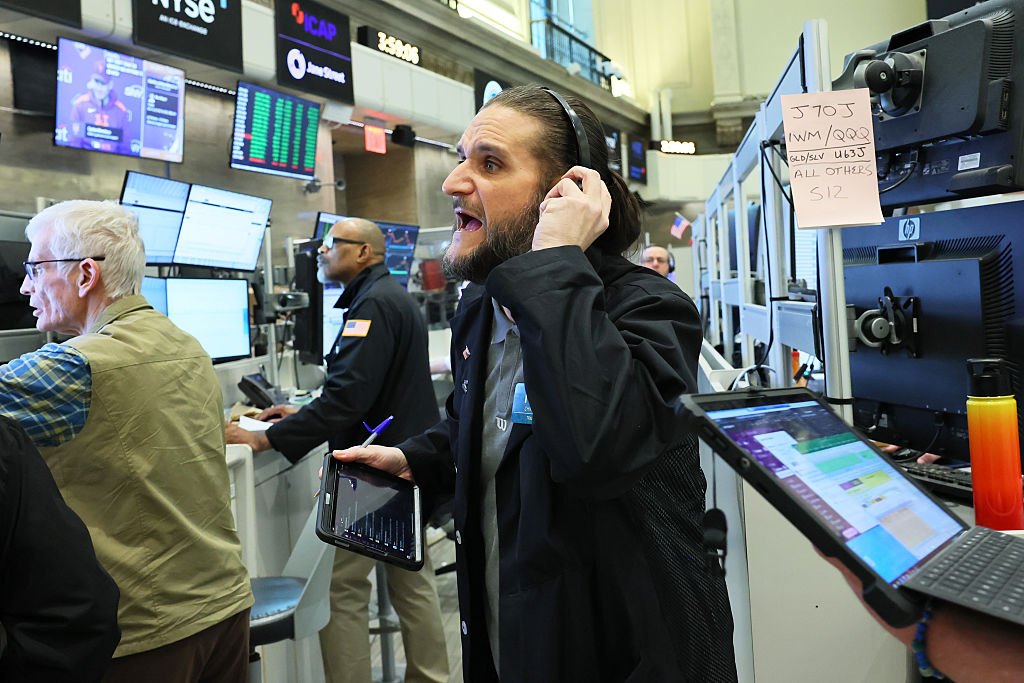
US President Donald Trump's stunning decision to pause the hefty duties he had just imposed on dozens of countries sent battered global stock markets surging on Thursday, even as he ratcheted up a trade war with the world's No 2 economy China.
Trump's turnabout on Wednesday (local time), which came less than 24 hours after steep new tariffs kicked in on most trading partners, followed the most intense episode of financial market volatility since the early days of the Covid-19 pandemic in 2020.
The upheaval erased trillions of dollars from stock markets and led to an unsettling surge in US government bond yields that appeared to catch Trump's attention.
"I thought that people were jumping a little bit out of line, they were getting yippy, you know," Trump told reporters after the announcement, referring to jitters sportpeople sometimes get.
US stock indexes shot higher on the news, with the benchmark S&P 500 index closing 9.5% up. Bond yields came off earlier highs and the dollar rebounded against safe-haven currencies.
The relief spread through Asian markets as they opened on Thursday - Japan's Nikkei index surging almost 9% while European futures also pointed to a sharp rebound. Even Chinese stocks rose, propped up by hopes of state support.
In the latest twist, Trump said he would suspend targeted tariffs on other countries for three months to allow time for US officials to negotiate with countries that have sought to reduce them.
Despite insisting for days that his policies would never change, he told reporters on Wednesday: "You have to be flexible."
But he kept the pressure on China, the second biggest provider of US imports. Trump said he would raise the tariff on Chinese imports to 125% from the 104% level that took effect at midnight on Tuesday.
Beijing on Wednesday slapped 84% tariffs on US imports to match Trump's earlier tariff salvo and has vowed not "fight to the end" in an escalating tit-for-tat trade dispute between the world's top two economies.
Trump repeated his belief that trade deals would be reached with many countries eventually, including China. But officials have said they will prioritise talks with other countries.
"China wants to make a deal. They just don't know how quite to go about it... President Xi (Jinping) is a proud man... They don't know quite how to go about it, but they'll figure it out," the President said.
Trump's reversal on the country-specific tariffs is not absolute. A 10% blanket duty on almost all US imports will remain in effect, the White House said. The announcement also does not appear to affect duties on autos, steel and aluminium that are already in place.

'Magnificent Seven' rebound
The 90-day freeze also does not apply to duties paid by Canada and Mexico, because their goods are still subject to 25% fentanyl-related tariffs if they do not comply with the US-Mexico-Canada trade agreement's rules of origin.
"China is unlikely to change its strategy: stand firm, absorb pressure, and let Trump overplay his hand. Beijing believes Trump sees concessions as a weakness, so giving ground only invites more pressure," said Daniel Russel, vice president of international security and diplomacy at the Asia Society Policy Institute.
"Other countries will welcome the 90-day stay of execution - if it lasts - but the whiplash from constant zigzags creates more of the uncertainty that businesses and governments hate."
Trump's tariffs had sparked a days-long selloff that erased trillions of dollars from global stocks and pressured US Treasury bonds and the dollar, which form the backbone of the global financial system. Canada and Japan said they would step in to provide stability if needed - a task usually performed by the US during times of economic crisis.
Analysts said the sudden spike in share prices might not undo all of the damage. Surveys have found slowing business investment and household spending due to worries about the impact of the tariffs, and a Reuters/Ipsos survey found that three out of four Americans expect prices to increase in the months ahead.
"Huge moves in the marketplace right now, particularly on equities who are taking this news very well," said Amarjit Sahota, executive director at Klarity FX in San Francisco.
"But the questions are really going to come: why did we see this reprieve today and is it even a good idea? Personally, I don't think it's a good idea: 90-day pause just creates more uncertainty for 90 days."
Wednesday was a record day for trading volume with 30.5 billion shares changing hands on US exchanges, compared with the 18.06 billion average for the last 20 sessions.
The "Magnificent Seven" stocks amassed more than $US1.5 trillion ($NZ2.6 trillion) in market value. The gains did not erase the $US3.4 trillion in value the companies have collectively shed since their peak in late 2024, with some $2 trillion of those losses coming since last week.
But the reprieve gave investors a reason to buy back these expensive stocks, whose valuations had reached stratospheric levels as the companies bet billions of dollars on building out artificial-intelligence infrastructure.
Shares of the seven companies - AI chip giant Nvidia, Apple, Tesla, Microsoft, Alphabet, Facebook-parent Meta and Amazon closed up between 9.68% and 22.69%.
'Trump's strategy all along'
Since returning to the White House for a second term, Trump has repeatedly threatened an array of punitive measures on trading partners, only to revoke some of them at the last minute. The on-again, off-again approach has baffled world leaders and spooked business executives, who say the uncertainty has made it difficult to forecast market conditions.
“Trump is gaining a reputation now for flip-flopping on tariffs and not having a consistent economic policy," said Marcus Brookes of Quilter Investors.
Treasury Secretary Bessent shrugged off questions about market turmoil and said the abrupt reversal rewarded countries that had heeded Trump's advice to refrain from retaliation.
He suggested the president had used the tariffs to create maximum negotiating leverage. "This was his strategy all along," he told reporters. “And you might even say that he goaded China into a bad position."
Bessent is the point person in the country-by-country negotiations that could address foreign aid and military cooperation as well as economic matters. Trump has spoken with leaders of Japan and South Korea, and a delegation from Vietnam was due to meet with US officials on Wednesday.
Bessent declined to say how long negotiations with the more than 75 countries that have reached out might take.
Trump told reporters that he had been considering a pause for several days. On Monday, the White House denounced a report that the administration was considering such a move, calling it "fake news."
Earlier on Wednesday, before the announcement, Trump tried to reassure investors, posting on his Truth Social account, "BE COOL! Everything is going to work out well. The USA will be bigger and better than ever before!"
Later, he added: "THIS IS A GREAT TIME TO BUY!!!"
Yuan lowest since GFC
China's yuan on Thursday fell to its lowest value against the US dollar since the 2008 Global Financial Crisis, with the central bank cutting guidance for the sixth successive trading session against a backdrop of intensifying Sino-US trade tension.
The country has imposed steep tariffs on US imports in response to similar US action.
A weaker yuan would make Chinese exports cheaper and alleviate tariff impact on the economy. However, a sharp decline could increase unwanted capital outflow pressure and risk financial stability, analysts and economists said. The central bank will not allow sharp yuan declines and has instructed major state-owned lenders to reduce dollar purchases, people with knowledge of the matter told Reuters.











